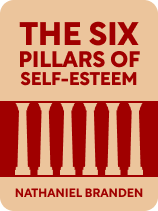

This article is an excerpt from the Shortform book guide to "The Six Pillars of Self-Esteem" by Nathaniel Branden. Shortform has the world's best summaries and analyses of books you should be reading.
Like this article? Sign up for a free trial here .
Do you consider yourself a person of high self-esteem? What are the psychological benefits of high self-esteem?
High self-esteem benefits every area of your life and makes you generally happier. People who think highly of themselves will chase more ambitious goals and are more likely to achieve them.
Keep reading to learn how self-esteem correlates positively with several traits that improve happiness.
The Benefits of High Self-Esteem
The psychological benefits of high self-esteem cannot be underestimated. This is partly due to self-fulfilling prophecies: High self-esteem drives you to take positive actions, which creates positive results, which leads to even more positive actions. For example, when you have good self-esteem, you go after and are more likely to achieve more meaningful goals.
Psychotherapist and self-esteem expert Nathaniel Branden suggests that self-esteem correlates positively with several traits that affect your ability to succeed and be happy, including:
Rationality
When you’re rational, you respect evidence, and you understand that two contradictory statements cannot simultaneously be true in the same way. As such, you change your thoughts when they’re proven wrong instead of clinging to them. High self-esteem correlates with greater rationality because, as we’ll learn in Pillar #1, self-esteem requires that you look for and respond appropriately to evidence. (Shortform note: In actuality, most of us don’t change our minds because we rarely believe we’ve been proven wrong. This is due to confirmation bias, which Kahneman describes in Thinking, Fast and Slow: We tend to find and interpret information in ways that confirm our existing beliefs and undervalue information that contradicts them.)
Intuitiveness and Creativity
Both intuitiveness and creativity require trust in your own mind. Your intuitions stem from subconscious thoughts that you can’t explain logically, so you must trust your mind enough to believe and act on such thoughts. (Shortform note: One study adds that your unconscious assessment of your own self-esteem levels is an act of intuition in and of itself.) Similarly, you only act on your creative insights if you believe that you’re capable of good ones. As such, high self-esteem correlates with both intuitiveness and creativity. (Shortform note: However, research suggests a caveat: One study found that people who have high self-esteem in a specific area are more creative in that area.)
Independence
When you’re confident in your own capability, you take ownership of your decisions and trust your ability to make them without others’ input—so high self-esteem correlates with higher independence. (Shortform note: This may be especially true when your self-image is questioned: One study found that someone whose ego is threatened becomes more independent if they have high self-esteem, but more reliant on others if they have low self-esteem.)
The Consequences of Low Self-Esteem
Just as healthy self-esteem benefits you, poor self-esteem harms you. In this section, you’ll learn how having low self-esteem causes you to behave in ways that further erode your self-esteem, diminish your happiness, and create problems in your relationships and work. We’ll also discuss how low self-esteem can be concealed by a false sense of self-esteem that may ultimately cause greater harm.
Branden warns that poor self-esteem encourages fear—and thus obstructs your ability to raise your self-esteem. He contends that to increase your self-esteem, you must believe that you’re capable and worthy of facing reality—about yourself, others, the circumstances of your life, and the consequences of your actions. But if you suspect you’re not capable or worthy, you don’t look for answers because you fear that they might prove you right: In other words, low self-esteem makes you afraid of facing reality. So you instead find comfort in the idea that you behave how you do because it’s who you are. Your behavior aligns with this image—which, as we’ve seen, lowers your self-esteem even further, creating a vicious cycle.
For example, if you have low self-esteem, you might fear that you’re incapable of sending out a strong job application—and then grow so paralyzed by this fear that you never bother to create one. You then create an image of yourself that you’re the kind of person who can’t find a job, and then you continue behavior that prevents you from finding a job—like not filling in the application.
Branden adds that if you have low self-esteem, you’re more likely to struggle in your romantic relationships. When you don’t love yourself, you’re unable to give love to others. So you instead look for others to give you the approval you can’t give yourself. This isn’t really love, Branden posits, but rather a search for validation. Worse, if you do receive love, you can’t accept it. When reality clashes with your narrative that you’re unlovable, you grow anxious. But you never consider that your narrative is wrong. Instead, you resolve your anxiety by making reality match what you believe and taking self-sabotaging actions that prove you’re unlovable—like being cruel to partners who treat you well until they get fed up with your mistreatment and leave.
Moreover, low self-esteem damages your ability to succeed at work, too. Notably, you may feel threatened by others’ success. Since you’re unconfident in your own abilities, you judge others’ accomplishments not by their own merits but by how they reflect on you: When they succeed, you feel jealous and worry that their achievement will show the world how little you’re accomplishing. This may lead you to engage in destructive behavior, like being unnecessarily rude to your successful colleague.
Finally, some people with low self-esteem develop a false sense of self-esteem, or “pseudo self-esteem”—which, Branden warns, is dangerous. They don’t want to admit that they feel incapable and unworthy, so they find external sources of validation—like friends or lovers or possessions. For example, you may derive your self-worth from the attractiveness of your spouse. But this isn’t true self-esteem, Branden contends. Self-esteem ultimately comes from how you—not others—view yourself. So self-esteem that comes primarily from others lacks the benefits of true self-esteem. Moreover, Branden warns, it risks making you dependent on how others view you—which would lower your self-esteem even more.

———End of Preview———
Like what you just read? Read the rest of the world's best book summary and analysis of Nathaniel Branden's "The Six Pillars of Self-Esteem" at Shortform .
Here's what you'll find in our full The Six Pillars of Self-Esteem summary :
- Exactly how to behave to improve your self-esteem
- Why you need to take responsibility for your life and actions
- Why so many self-esteem techniques don't work






